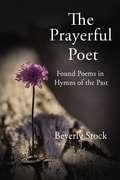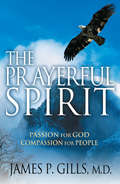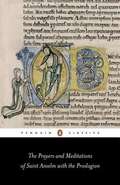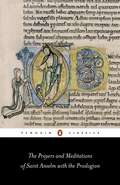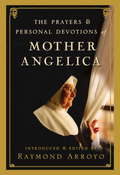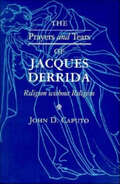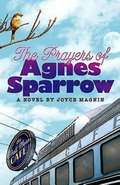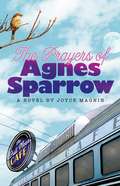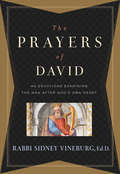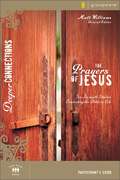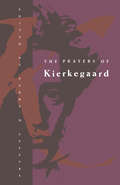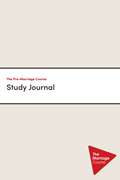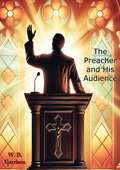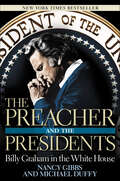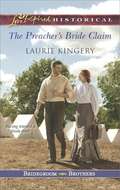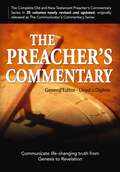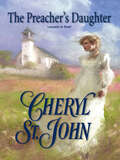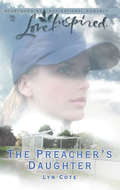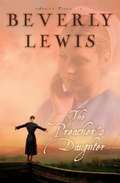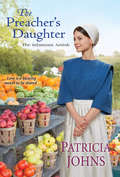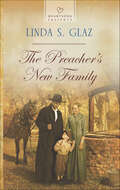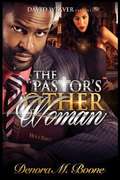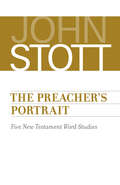- Table View
- List View
The Prayerful Poet: Found Poems In Hymns of the Past
by Beverly StockBeverly Stock is a feature writer turned poet from St. Louis, Missouri. Noted for her whimsical, thoughtful style, Beverly is passionate about creating work that explores the joys, challenges, and surprises of everyday life. The Prayerful Poet is her first collection of verse. Brimming with joy, wonder, and tenderness, this stirring volume takes inspiration from traditional Christian hymns and classic spiritual works.Each poem combines Beverly&’s poetic adaptations with the time-honored hymnal lyrics and finds fresh meaning in traditional songs of praise. A mixture of grand voices and elegiac laments, The Prayerful Poet engages readers with its hopeful perspective, and is a perfect read for anyone who finds beauty in the divine.
The Prayerful Spirit: Passion for God, Compassion for People
by Dr. James P. GillsBook Description:Faithful. Fervent. Focused. Does that describe your prayer life? In The Prayerful Spirit, Dr. James P. Gills tells us how prayer has changed his life, how it has changed the lives of other doctors and their patients, and how it can change your life. &“Prayer is, I believe, the most interesting subject in the universe, and one that produces, strangely, a lot of dull books. Dr. Gills&’ book is a compelling statement on a compelling subject. As I read it, I kept thinking, This is good, solid, basic, biblical, interesting. The emphasis on physicians and prayer is especially good. Read it!&” -Bill Anderson, Senior Minister, Calvary Baptist Church, Clearwater, Florida &“Jim Gills is a beloved friend, a magnificent servant of Christ, and a powerful witness.&” -Chuck Colson, Chairman of Prison Fellowship Ministries About the author: James P. Gills, M.D. has earned a reputation as the most experienced cataract surgeon in the world. He is the founder and medical director of the renowned St. Luke's Cataract & Laser Institute in Tarpon Springs, Florida. Dr. Gills has dedictaed his life to restoring much more than physical version. His not-for-profit publishing outreach, Love Press, has ditributed well over three million copies of his books on a donation basis through LoveLines: The Honor Innovation.
The Prayers and Meditations of St. Anselm
by St. Anselm Benedicta WardAnselm of Aosta wrote the majority of his Prayers and Meditations between 1070 and 1080 and created a tradition of intimate, intensely personal prayer that drastically altered the Christian attitude to private devotion.
The Prayers and Meditations of St. Anselm with the Proslogion
by AnselmMostly written between 1070 and 1080, before he became Archbishop of Canterbury, the prayers and meditations of Anselm of Aosta created a tradition of intimate, intensely personal devotional works written in subtle and theologically daring prose. While the Prayer to God is based on the Lord's Prayer, the Prayer to Christ is inspired by ardent private emotion and other prayers invest saints with individual attributes, with John the Baptist as the friend, Peter as the shepherd and Mary Magdalene as the forgiving lover, among many others. The meditations include a searching exploration of the state of the soul and a lament on the loss of purity, and the Proslogion discusses the mysteries of faith. With their bright imagery, beautiful language and highly original thought, the works of Anselm have secured a lasting place in both religious and secular literature.
The Prayers and Personal Devotions of Mother Angelica
by Raymond ArroyoFor the first time, you can pray with a woman who has transformed the lives of millions around the world.This precious collection gives readers a chance to experience the personal, daily, spiritual practice of Mother Angelica. Seen by millions each day on the television network she founded, Mother Angelica is one of the most trusted and beloved religious figures of our time. Her words of wisdom about the spiritual life have been broadcast throughout the world on EWTN and have become New York Times bestselling books. For Mother the act of prayer is an unceasing daily conversation with the Divine--one that has been a source of inspiration and solace for nearly seven decades. Now Mother Angelica shares a lifetime of her private prayers and devotions so that you can experience and utter the very words that have shaped her incredible life.This treasury of material, much of it never before published, includes:* A complete prayer journal composed during Mother's personal dark night of the soul* Handwritten meditations offered to her sisters* Two moving versions of the Stations of the Cross composed for her community* Devotions and petitions from her early religious lifeThroughout, Mother Angelica's humor, warmth, and wisdom shine through. More than a collection of prayers, this special volume is an intimate portrait of one of the world's great women of faith. For devoted fans of Mother Angelica as well as for those just coming to know her, this inspiring guide will be a cherished companion along each step of the path to holiness.From the Hardcover edition.
The Prayers and Tears of Jacques Derrida: Religion without Religion (Indiana Series in the Philosophy of Religion Ser.)
by John D. Caputo"Caputo's book is riveting. . . . A singular achievement of stylistic brio and impeccable scholarship, it breaks new ground in making a powerful case for treating Derrida as homo religiosis. . . . There can be no mistaking the importance of Caputo's work." —Edith Wyschogrod"No one interested in Derrida, in Caputo, or in the larger question of postmodernism and religion can afford to ignore this pathbreaking study. Taking full advantage of the most recent and least discussed writings of Derrida, it offers a careful and comprehensive account of the religious dimension of Derrida's thought." —Merold Westphal
The Prayers of Agnes Sparrow
by Joyce MagninThe Prayers of Agnes Sparrow is the story of an unusual woman, Agnes Sparrow. No longer able or willing to leave her home, where she is cared for by her long-suffering sister Griselda, Agnes has committed her life to the one thing she can do--besides eat. Agnes Sparrow prays and when Agnes prays things happen, including major miracles of the cancer, ulcer-healing variety along with various minor miracles not the least of which is the recovery of lost objects and a prize-winning pumpkin. The rural residents of Bright's Pond are so enamored with Agnes they plan to have a sign erected on the interstate that reads, "Welcome to Bright's Pond, Home of Agnes Sparrow." This is something Agnes doesn't want and sends Griselda to fight city hall. Griselda's petitions are shot down and the sign plans press forward until a stranger comes to town looking for his miracle from Agnes. The truth of Agnes's odd motivation comes out when the town reels after the murder of a beloved community member. How could Agnes allow such evil in their midst? Didn't she know? Well, the prayers of Agnes Sparrow have more to do with Agnes than God. Agnes has been praying to atone for a sin committed when she was a child. After some tense days, the townsfolk, Griselda, and Agnes decide they all need to find their way back to the true source of the miracles--God.
The Prayers of Agnes Sparrow: A Novel of Bright's Pond
by Joyce MagninThe Prayers of Agnes Sparrow is the story of an unusual woman, Agnes Sparrow. No longer able or willing to leave her home, where she is cared for by her long-suffering sister Griselda, Agnes has committed her life to the one thing she can do--besides eat. Agnes Sparrow prays and when Agnes prays things happen, including major miracles of the cancer, ulcer-healing variety along with various minor miracles not the least of which is the recovery of lost objects and a prize-winning pumpkin. The rural residents of Bright's Pond are so enamored with Agnes they plan to have a sign erected on the interstate that reads, "Welcome to Bright's Pond, Home of Agnes Sparrow." This is something Agnes doesn't want and sends Griselda to fight city hall. Griselda's petitions are shot down and the sign plans press forward until a stranger comes to town looking for his miracle from Agnes. The truth of Agnes's odd motivation comes out when the town reels after the murder of a beloved community member. How could Agnes allow such evil in their midst? Didn't she know? Well, the prayers of Agnes Sparrow have more to do with Agnes than God. Agnes has been praying to atone for a sin committed when she was a child. After some tense days, the townsfolk, Griselda, and Agnes decide they all need to find their way back to the true source of the miracles--God.
The Prayers of David: 40 Devotions Examining the Man After God's Own Heart
by Rabbi Sidney Vineburg Museum of the Bible BooksDavid was a man after God’s own heart, not because he was perfect, but because he always sought God through prayer. It is through his example we can learn to pray in all things at all times. The Prayers of David combines faithful scholarship with accessible writing to bring a personal level of reflection to these emotionally powerful prayers. Cross references and cultural and historical content bring a richer understanding of the Old Testament, while powerful inspirational writing inspires you to model your own prayer life after David’s example.
The Prayers of Jesus Participant's Guide
by Matt WilliamsPrayer was the backbone of Jesus’ life and ministry. From his baptism to his crucifixion, the Gospels portray Jesus as a man of prayer who knew and deeply valued intimate communion with his heavenly Father. What can we learn from the prayers he prayed? In six engaging, interactive small group sessions, this Deep Connection DVD helps you explore the prayers of Jesus to gain new insights into prayer, the character of God, and how to deepen your relationship with him. With maps and pictures, outlines, key Scripture verses, discussion questions, plenty of room for note taking, and a personal five-day Bible study for each session, this participant’s guide will help you get the most out of The Prayers of Jesus, both in your group and in applying what you learn to your life.
The Prayers of Kierkegaard (Phoenix Bks.)
by Perry D. LefevreSoren Kierkegaard's influence has been felt in many areas of human thought from theology to psychology. The nearly one hundred of his prayers gathered here from published works and private papers, not only illuminate his own life of prayer, but speak to the concerns of Christians today. The second part of the volume is a reinterpretation of the life and thought of Kierkegaard. Long regarded as primarily a poet or a philosopher, Kierkegaard is revealed as a fundamentally religious thinker whose central problem was that of becoming a Christian, of realizing personal existence. Perry D. LeFevre's penetrating analysis takes the reader to the religious center of Kierkegaard's world.
The Pre-Marriage Course Study Journal
by Nicky Lee Sila LeeThe Pre-Marriage Course was developed by Nicky and Sila Lee who oversee family ministries at HTB Church in London. The course offers a married couple the tools to build a strong and healthy relationship that lasts a lifetime. During each evening, couples talk about important issues that can get swept under the carpet in the rush of daily life. While the course is based on Christian principles, it is designed for couples with or without a church background.This study journal for guests is designed to be used in conjunction with The Pre-Marriage Course Film Series. The series of five sessions is designed to help couples, who are engaged or thinking about marriage, prepare for their future.Sessions cover:CommunicationConflictCommitmentConnectionAdventureDesigned for use with The Pre-Marriage Course DVD Film Series (9780310122470), sold separately.
The Preacher Had Ten Kids
by Frances BradsherLove; courage, humor, and faith never go out of style: No longer do we pay our preachers in turnips, plow our fields with mules, or get a good restaurant meal for 35 cents. But family spirit remains the same, whether one lives in the countryside of Kentucky at the turn of the century or in the fast-paced America of the 80s. And in the home of the itinerant preacher, the Rev. Jeremiah Taylor Cherry, ten active children produced a poverty of money but a wealth of spirit. In this charming book Frances Bradsher relates the true story of her family life with a sparkle and warmth that makes it as irresistible as the Walton saga. Frances Cherry Bradsher lives in Chapel Hill, North Carolina. She is the co-author with her daughter Cherry Parker, of a collection of country recipes--The Hand-Me-Down Cookbook. Mrs. Bradsher teaches a Sunday school class at the local Baptist church and has many hobbies, including quilting and sewing for her children and grandchildren.
The Preacher and His Audience
by W. B. GarrisonW. B. Garrison’s "The Preacher and His Audience" offers an insightful and practical guide for anyone involved in the art of preaching and public speaking. This comprehensive work delves into the dynamics between the preacher and the congregation, providing valuable strategies for delivering impactful and engaging sermons that resonate with listeners.Garrison, drawing on his extensive experience as a preacher and educator, explores the multifaceted relationship between the speaker and the audience. He emphasizes the importance of understanding the needs, expectations, and spiritual journeys of the congregation to craft messages that are both meaningful and transformative. Through clear and accessible prose, Garrison provides a roadmap for preachers to connect deeply with their audience, fostering a sense of community and shared purpose.The book covers a wide range of topics essential for effective preaching, including sermon preparation, delivery techniques, and the use of language and storytelling to captivate and inspire. Garrison also addresses the challenges of maintaining authenticity and emotional honesty, encouraging preachers to bring their true selves to the pulpit. His practical advice is grounded in real-world examples and enriched by his own experiences, making the guidance relatable and actionable."The Preacher and His Audience" also explores the evolving role of the preacher in contemporary society. Garrison discusses the impact of cultural shifts, technological advancements, and changing congregational demographics on the practice of preaching. He offers innovative approaches to engage diverse audiences, ensuring that the message remains relevant and accessible in an ever-changing world.This book is an invaluable resource for seasoned preachers, aspiring ministers, and anyone interested in the art of effective communication. Garrison’s blend of theoretical insights and practical advice equips readers with the tools they need to deliver sermons that not only convey deep spiritual truths but also inspire and uplift their audience.
The Preacher and the Presidents: Billy Graham in the White House
by Nancy Gibbs Michael DuffyNo one man or woman has ever been in a position to see the presidents, and the presidency, so intimately, over so many years. They called him in for photo opportunities. They called for comfort. They asked about death and salvation; about sin and forgiveness. At a time when the nation is increasingly split over the place of religion in public life, The Preachers and the Presidents reveals how the world's most powerful men and world's most famous evangelist, Billy Graham, knit faith and politics together.
The Preacher's Bride Claim
by Laurie KingeryClaiming Their FutureFor the Thornton brothers, the Oklahoma Land Rush is the perfect opportunity to finally put down some roots. A new start, a new community-what more could preacher Elijah Thornton need? Not a wife-not after the pain of losing his fiancée. But something draws him to the pretty nurse whose eyes are clouded by trouble.Only by claiming her own homestead can Alice Hawthorne avoid an unwanted marriage. Even Oklahoma may not be far enough away from New York to escape her past. Yet with courage-and the handsome reverend's support-can she forge a loving future?Bridegroom Brothers: True love awaits three siblings in the Oklahoma Land Rush
The Preacher's Commentary Series, Volumes 1-35: Genesis - Revelation
by Stuart Briscoe Lloyg OgelvieGeneral editor Lloyd J. Ogilvie brings together a team of skilled and exceptional communicators to blend sound scholarship with life-related illustrations. This eBook contains the entire 35 Volume Series, Genesis - Revelation.The design for the Preacher's Commentary gives the reader an overall outline of each book of the Bible. Following the introduction, which reveals the author's approach and salient background on the book, each chapter of the commentary provides the Scripture to be exposited. The New King James Bible has been chosen for the Preacher's Commentary because it combines with integrity the beauty of language, underlying Hebrew and Greek textual basis, and thought-flow of the 1611 King James Version, while replacing obsolete verb forms and other archaisms with their everyday contemporary counterparts for greater readability. Reverence for God is preserved in the capitalization of all pronouns referring to the Father, Son, or Holy Spirit. Readers who are more comfortable with another translation can readily find the parallel passage by means of the chapter and verse reference at the end of each passage being exposited. The paragraphs of exposition combine fresh insights to the Scripture, application, rich illustrative material, and innovative ways of utilizing the vibrant truth for his or her own life and for the challenge of communicating it with vigor and vitality.
The Preacher's Commentary Series, Volumes 1-35: Genesis - Revelation
by Stuart BriscoeGeneral editor Lloyd J. Ogilvie brings together a team of skilled and exceptional communicators to blend sound scholarship with life-related illustrations. This eBook contains the entire 35 Volume Series, Genesis - Revelation. The design for the Preacher's Commentary gives the reader an overall outline of each book of the Bible. Following the introduction, which reveals the author's approach and salient background on the book, each chapter of the commentary provides the Scripture to be exposited. The New King James Bible has been chosen for the Preacher's Commentary because it combines with integrity the beauty of language, underlying Hebrew and Greek textual basis, and thought-flow of the 1611 King James Version, while replacing obsolete verb forms and other archaisms with their everyday contemporary counterparts for greater readability. Reverence for God is preserved in the capitalization of all pronouns referring to the Father, Son, or Holy Spirit. Readers who are more comfortable with another translation can readily find the parallel passage by means of the chapter and verse reference at the end of each passage being exposited. The paragraphs of exposition combine fresh insights to the Scripture, application, rich illustrative material, and innovative ways of utilizing the vibrant truth for his or her own life and for the challenge of communicating it with vigor and vitality.
The Preacher's Daughter
by Cheryl St. JohnIn 1894 Kansas, a woman in need of freedom meets a man in need of faith . . .An untouched woman . . .Lorabeth Holdridge longed for life and experience. Cloistered by her strict father, her world was confined to chores and prayer. Her chance of escape came when she took a job as housekeeper to a boisterous family. Lorabeth reveled in her newfound freedom. And when Benjamin Chaney visited, she felt the stirrings of her first crush.A hard-bitten man . . .Jaded and cynical, Ben found it hard to trust, though Lorabeth’s sweetness soothed his battered soul and taught him joy. But he would have to face the demons of his past to find a glorious future in Lorabeth’s arms . . .Praise for Cheryl St. John“A style reminiscent of LaVyrle Spencer’s earliest books.” —Linda Howard, New York Times–bestselling author of The Woman Left Behind“An exquisitely tender and beautiful love story.” —RT Booklovers
The Preacher's Daughter
by Lyn CotePastor Tanner Bond needed to break down the barriers between his congregation and the Mexican-Americans who had recently moved to Pleasant Prairie. But he didn' t expect God to send him Lucie Hansen.... Lucie was bold, brash and bilingual. She was determined to help Tanner understand the new Hispanic residents, but she was also his complete opposite-- impulsive and confident, while he pondered and prayed before acting. Growing up as a " preacher' s kid," Lucie had resented the restrictions put on her. She didn' t want to have feelings for Tanner... even though she did. Would her rush to bring harmony do more harm than good? And would the preacher' s daughter realize she' d make a perfect pastor' s wife?
The Preacher's Daughter (Annie's People #1)
by Beverly LewisA preacher's daughter in an Amish order in Pennsylvania has conflicting emotions. Should she join the church? How can she get the boy she loves back? Should her non-Amish friend come to visit?
The Preacher's Daughter (The Infamous Amish #2)
by Patricia JohnsFans of Beverly Lewis and Samantha Price will adore this warm and wholesome romance set in a small Pennsylvania Amish community. While betrayal rocks the faith of one Amish family, the return of a prodigal son both heals and disrupts another. Each will learn the blessings of marriage, home, togetherness, and the power of love&’s redemption. &“This lovely tale will resonate with readers.&” —Publishers Weekly With her preacher father in prison for fraud, Elizabeth Yoder&’s life in the community of Bountiful has been painfully uprooted. Mindful of wearing out her welcome with her family, she jumps at the chance to stay with elderly Bridget Lantz while the woman&’s daughter is away. Elizabeth has secret plans to leave for another Amish community where she might get a fresh start, but here with Bridget, she feels comfortable—until Bridget&’s strapping grandson, Solomon, returns from eight years with the English, and inspires feelings that shake Elizabeth&’s resolution . . . Solomon has had his own trouble with the law, after falling in with some bad influences. He&’s paid the price, despite his innocence, but the Amish are even more wary of him than they are of spirited Elizabeth. With good reason, he supposes—he&’s not sure he&’s ready to commit to this way of life again, especially since the Englishers are the ones offering him solutions. The only thing that seems certain is his attraction to Elizabeth. As they strive to find their places in the community, and with each other, can they open their hearts to the blessing of love?
The Preacher's New Family
by Linda S. GlazPREACHER T.J. O'BRIEN ISN'T LOOKING FOR A WIFE AND FAMILY Yet every time he sees Sarah Anne Rycroft, he feels a powerful urge to protect the beautiful young widow. When she's in danger of losing the farm to the bank, T.J. steps in to defend Sarah against the unscrupulous banker. Sarah knows T.J. has vowed to live a solitary life of devotion to God. Still, the single mother can't resist the comfort and safety of his strong arms. But when he sells his most prized possession to save the farm from foreclosure, she wonders if the handsome preacher could have marriage on his mind, after all.
The Preacher's Other Woman
by Denora BooneAndrew "Drew" Webber is the epitome of a man of God. Or is he? Drew preaches every Sunday to bring God's people closer to Him and he's always going out of his way to be a help to someone in his flock. He has been leading his wife's family church for the last ten years, but is that really his calling? Jewel Webber is the beautiful, yet insecure wife of Drew. She loves her husband and their two daughters more than anything in life, but past hurts have caused her to remain in a depressed state of mind for so long that she has become complacent in her insecurities. Putting on a smile for the people, and even her family has Jewel making mistakes that could come back to either haunt or help her in the end. Jasmine is Jewel's best friend, and it had been that way since their freshman year of college. She could never understand how Jewel had so much but was always miserable. Jewel had so many people who cherished her but she always found something about her appearance that sent her over the edge and Jasmine was tired of it. If Jewel couldn't be happy with the life God has blessed her with, then Jasmine would just claim it as her own. Only there was one problem. . . she wasn't Drew's only kept secret. Bryce is Drew's best friend. They ran the streets together back in the day and had plenty of ladies beating down their doors. It was all fun and games until his eyes and heart fell for the one and only Jewel Rivers, she just wouldnt fall for him. Bryce always knew that he was called to preach and after plenty of childhood mistakes he wanted to do right and he wanted his boy Drew to follow suit. But that was easier said than done. Will God be forgiving to Bryce in the end by presenting him with his "good thing" or will he himself have to suffer the wrath that God dishes out? How can a man of the cloth have such a sinister heart and everything he preached was a lie? Would God continue to cover him or does the collar he so expertly wears begin to choke him as secrets are revealed? Will Drew even care? Could it be that he and his wife are indeed "equally yoked" because they are playing with the same fire of destruction? Or will the pastor's other woman hold all of the cards in the end?
The Preacher's Portrait: Five New Testament Word Studies
by John StottConvinced that knowing the Word of God is fundamental to preaching, John Stott here presents brief studies of five New Testament metaphors that characterize preachers: steward, herald, witness, father, and servant. In the course of these five studies, Stott discusses the message and authority of preachers, the character of their proclamation, the vital necessity of their own experience of the gospel, and their motives and moral qualities, particularly humility, gentleness, and love. A biblically faithful portrayal of what preachers are supposed to be emerges from Stott&’s reflections —as he says, &“a portrait painted by the hand of God himself on the broad canvas of the New Testament.&”
